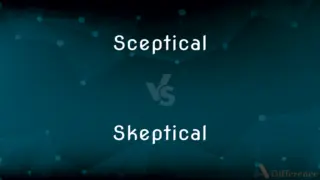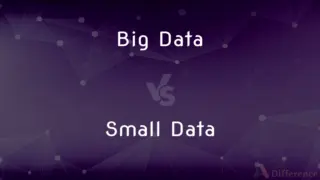Cyclic vs. Cyclical — What's the Difference?
By Tayyaba Rehman — Updated on September 24, 2023
Cyclic and Cyclical both refer to occurrences in cycles; however, cyclic often relates to circular motion or sequence, while cyclical usually pertains to events recurring in cycles, often in economics.

Difference Between Cyclic and Cyclical
Table of Contents
ADVERTISEMENT
Key Differences
Cyclic and Cyclical, while seemingly interchangeable, subtly differ in connotation and usage. Cyclic usually pertains to phenomena that occur in a cycle, a sequence, or a circular motion, and it’s often used in the context of mathematics or science to describe a repeating sequence or a rotational movement, emphasizing the systematic and orderly recurrence of components or processes within a specific framework or set parameters.
Cyclical, however, primarily refers to events that recur periodically, typically used in the context of economic fluctuations, societal trends, and natural phenomena, suggesting a predictable but not always uniform recurrence of events or states over time, often with varying intensity and impact, emphasizing the inherent and recurrent nature of certain phenomena in the universe, reflecting the periodic rise and fall, growth and decline, or accumulation and depletion inherent in many natural and man-made systems.
When we refer to something as cyclic, we usually denote the regularity and orderliness of the occurrence or structure, highlighting the systematic and repetitive nature of the phenomenon, such as a cyclic pattern or a cyclic process, where the emphasis is on the regular and orderly recurrence or arrangement of elements or events within a set framework or sequence.
Conversely, the term cyclical implies a natural and inherent recurrence of events or states over time, accentuating the predictable yet varying nature of such recurrences, such as cyclical unemployment or cyclical trends, where the focus is on the inherent and recurrent nature of certain phenomena, reflecting the inevitable ebb and flow, rise and fall, or growth and decline characteristic of many systems and processes in the world.
To recap, cyclic refers more to the orderly and regular recurrence or arrangement of elements or events in a set sequence or framework, often in a circular motion or a systematic pattern, while cyclical denotes the inherent and predictable recurrence of events or states over time, often with varying intensity and impact, reflecting the natural and periodic nature of many phenomena in the universe.
ADVERTISEMENT
Comparison Chart
Primary Usage
Mathematics, Science
Economics, Sociology
Connotation
Regularity and orderliness in sequence or structure.
Predictable but varying recurrence of events or states.
Contextual Application
Describes systematic and repetitive phenomena.
Emphasizes inherent and recurrent nature of phenomena.
Examples
Cyclic rotation, Cyclic sequence
Cyclical unemployment, Cyclical trends
Nuance
More about the orderly arrangement and repetition.
More about the natural and inherent recurrence.
Compare with Definitions
Cyclic
Relating to or occurring in a cycle or regularly repeated sequence.
The cyclic rotation of the earth affects day and night.
Cyclical
Characterized by or recurring in cycles.
The economy experiences cyclical changes, with periods of growth followed by contraction.
Cyclic
Involving a series of events or processes that repeat in the same order.
Many chemical reactions are cyclic, occurring in a predictable sequence.
Cyclical
Relating to a situation in which events happen in a repeated sequence.
The cyclical nature of fashion trends often sees styles return after several decades.
Cyclic
Pertaining to a phenomenon or process that occurs in a circular motion or pattern.
The cyclic motion of a spinning wheel is a common sight in pottery workshops.
Cyclical
Pertaining to phenomena that exhibit a periodic recurrence.
Certain animal behaviors are cyclical, coinciding with changes in the seasons.
Cyclic
Characterized by a recurring sequence or pattern.
The cyclic pattern of the seasons has been studied for centuries.
Cyclical
Denoting events or processes that show a regular and recurrent pattern of activity.
The stock market is inherently cyclical, with periods of bull and bear markets.
Cyclic
Representing a sequence or structure that repeats at regular intervals.
A cyclic process in mathematics can describe a range of repeating phenomena.
Cyclical
Of, relating to, or characterized by cycles
A cyclic pattern of weather changes.
Cyclic
Occurring in cycles; regularly repeated
The cyclic pattern of the last two decades
Cyclical
Recurring or moving in cycles
Cyclical history.
Cyclic
Relating to a circle or other closed curve.
Cyclical
(Chemistry) Of or relating to compounds having atoms arranged in a ring or closed-chain structure.
Cyclic
(of a compound) having a molecular structure containing one or more closed rings of atoms
A cyclic sulphonium salt
Cyclical
Having parts arranged in a whorl.
Cyclic
(of a flower) having its parts arranged in whorls.
Cyclical
Forming a whorl.
Cyclic
Of, relating to, or characterized by cycles
A cyclic pattern of weather changes.
Cyclical
Recurring at regular intervals
Cyclic
Recurring or moving in cycles
Cyclical history.
Cyclical
Recurring in cycles
Cyclic
(Chemistry) Of or relating to compounds having atoms arranged in a ring or closed-chain structure.
Cyclical
Reflecting the inherent and predictable recurrence of events over time.
Cyclical unemployment is influenced by changes in the economic cycle.
Cyclic
Having parts arranged in a whorl.
Cyclic
Forming a whorl.
Cyclic
Characterized by, or moving in cycles, or happening at regular intervals.
The weather had a cyclic pattern of rain and sun.
Cyclic
Having chains of atoms arranged in a ring.
Benzene and cyclohexane are both cyclic compounds.
Cyclic
(botany) Having parts arranged in a whorl.
Cyclic
Being generated by only one element.
Cyclic
Able to be inscribed in a circle.
Cyclic
Firing at its full cyclic rate.
Cyclic
(aviation) The flight control used to control a helicopter's direction and rate of horizontal movement by tilting the lift vector of the helicopter's main rotor disk.
Cyclic
Of or pertaining to a cycle or circle; moving in cycles; as, cyclical time.
Cyclic
Having atoms bonded to form a ring structure. Opposite of acyclic.
Cyclic
Recurring in cycles{2}; having a pattern that repeats at approximately equal intervals; periodic. Opposite of noncyclic.
Cyclic
Marked by repeated cycles{2}.
Cyclic
Conforming to the Carnot cycle
Cyclic
Botany; forming a whorl or having parts arranged in a whorl;
Cyclic petals
Cyclic flowers
Cyclic
Of a compound having atoms arranged in a ring structure
Cyclic
Recurring in cycles
Cyclic
Marked by repeated cycles
Common Curiosities
Is Cyclical often used to describe economic fluctuations?
Yes, cyclical is commonly used to describe the periodic rise and fall in economic activity and other recurrent events.
Can Cyclic be used in a scientific context?
Absolutely, cyclic is often used in science to describe phenomena occurring in a regular sequence or circular motion.
Is Cyclic associated more with regular sequences?
Yes, cyclic often relates to phenomena occurring in a regular, repeating sequence or structure.
Does Cyclical imply a natural and inherent recurrence of events?
Exactly, cyclical emphasizes the inherent and recurrent nature of certain phenomena, reflecting the periodic nature of many events in the universe.
Does Cyclic emphasize the regularity and orderliness of occurrences?
Indeed, cyclic emphasizes the systematic and orderly recurrence of elements or processes within specific parameters.
Does Cyclical refer to events that recur periodically?
Yes, cyclical typically refers to events that recur in predictable cycles, often with variable intensity.
Is Cyclic primarily used to describe circular motion or sequence?
Yes, cyclic is primarily used to describe phenomena occurring in a cycle, sequence, or circular motion.
Share Your Discovery

Previous Comparison
Empressed vs. Impressed
Next Comparison
Sentiment vs. SentimentalityAuthor Spotlight
Written by
Tayyaba RehmanTayyaba Rehman is a distinguished writer, currently serving as a primary contributor to askdifference.com. As a researcher in semantics and etymology, Tayyaba's passion for the complexity of languages and their distinctions has found a perfect home on the platform. Tayyaba delves into the intricacies of language, distinguishing between commonly confused words and phrases, thereby providing clarity for readers worldwide.















































